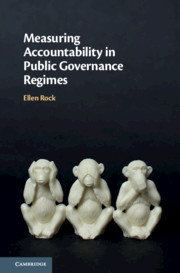Book contents
- Measuring Accountability in Public Governance Regimes
- Measuring Accountability in Public Governance Regimes
- Copyright page
- Dedication
- Contents
- Foreword
- Acknowledgements
- Table of Cases
- Table of Statutes
- Introduction
- Part I Accountability Deficits and Overloads
- 1 Defining Accountability
- 2 Too Little or Too Much of a Good Thing?
- Part II Benchmark of Accountability
- Part III The Complexity of Accountability Systems
- Conclusion
- Bibliography
- Index
2 - Too Little or Too Much of a Good Thing?
from Part I - Accountability Deficits and Overloads
Published online by Cambridge University Press: 28 September 2020
- Measuring Accountability in Public Governance Regimes
- Measuring Accountability in Public Governance Regimes
- Copyright page
- Dedication
- Contents
- Foreword
- Acknowledgements
- Table of Cases
- Table of Statutes
- Introduction
- Part I Accountability Deficits and Overloads
- 1 Defining Accountability
- 2 Too Little or Too Much of a Good Thing?
- Part II Benchmark of Accountability
- Part III The Complexity of Accountability Systems
- Conclusion
- Bibliography
- Index
Summary
One of the most prevalent themes in the accountability literature is claims about the ‘amount’ of accountability that applies in a given situation. There are claims of accountability ‘deficits’ (ie too little accountability) on the one hand, and claims of accountability ‘overload’ (ie too much accountability) on the other. This chapter draws out these claims and argues that, while these claims presuppose that accountability is a measurable concept, the literature often glosses over the underlying question of what is being measured, or how the measurement is to be conducted. This missing dimension of the literature is the core problem tackled in this book, which unpacks two of the hidden assumptions that underlie these claims. The first of these assumptions is that it is possible to identify some form of accountability benchmark, being a normative judgement as to the ‘ideal amount’ of accountability against which an arrangement can be measured and found wanting. The second is that it is possible to assess the universe of applicable accountability mechanisms against that benchmark, and to form a judgement as to whether the system underperforms (deficit) or overperforms (overload).
Keywords
- Type
- Chapter
- Information
- Measuring Accountability in Public Governance Regimes , pp. 25 - 36Publisher: Cambridge University PressPrint publication year: 2020



